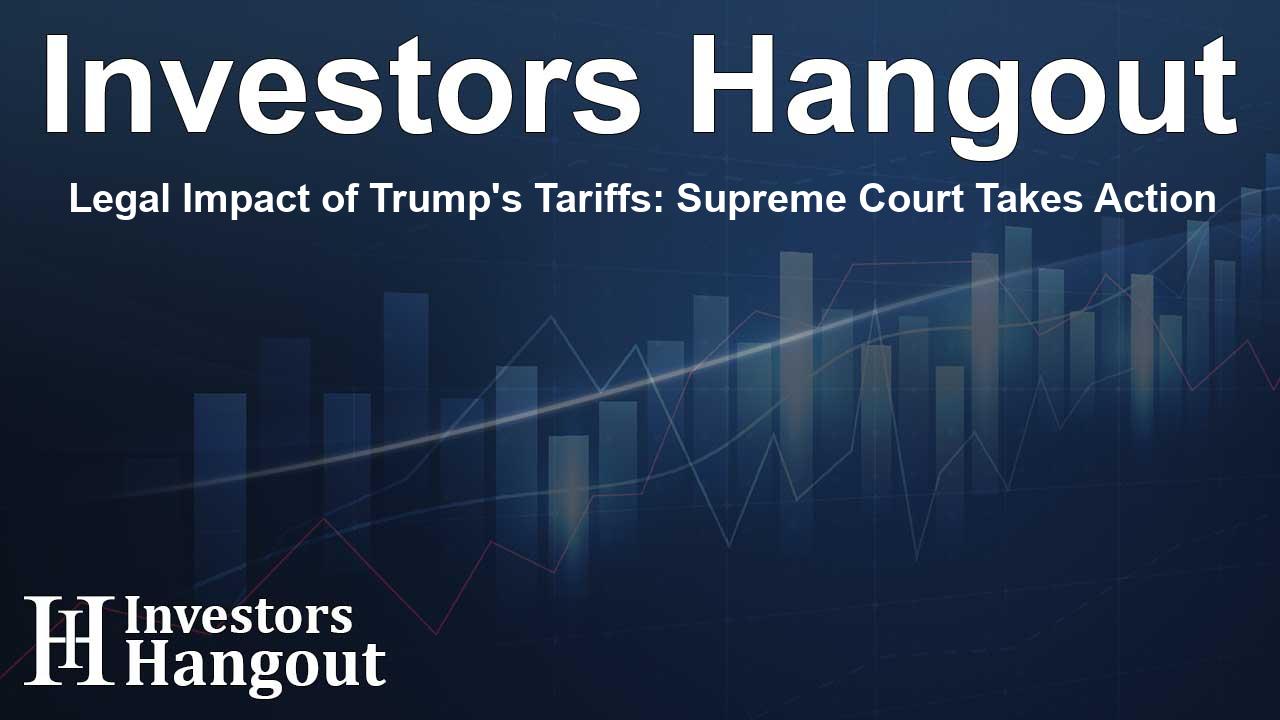Legal Impact of Trump's Tariffs: Supreme Court Takes Action

Trump Administration's Tariff Dilemma
The Supreme Court's recent decision to expedite hearings concerning the Trump Administration's tariff powers marks a significant moment in U.S. trade policy. As legal unease stirs around tariffs, the implications could ripple through numerous sectors.
$100 Million Tariff Impact
In a pivotal order, the Supreme Court consolidated two lawsuits into a single action under the titles of Learning Resources v. Trump and Trump v. V.O.S. Selections. Both cases will explore whether the 1977 International Emergency Economic Powers Act permits the President to impose tariffs, relying on national emergency claims.
Both Learning Resources and hand2mind, two family-owned companies, claim they are facing a staggering $100 million in tariffs for 2025, dramatically increasing from payments made the previous year.
Categories of Tariffs
Key tariffs introduced by the Trump administration fall under two distinct categories. The first addresses trafficking tariffs aimed primarily at goods from Canada, China, and Mexico to combat the influx of fentanyl. The second covers reciprocal tariffs, levying at least a 10% duty on imports from nearly all U.S. trading partners.
While the tension between legislative and executive powers heightens, the Supreme Court has asked both parties to prepare their briefs as oral arguments are scheduled for the opening week of the November 2025 session.
Challenges to the Tariff Powers
Previously, U.S. District Judge Rudolph Contreras determined that the tariffs exceeded the authority granted to the President under the International Emergency Economic Powers Act (IEEPA), prompting an appeal. Additionally, a more recent ruling has further complicated the landscape, with the U.S. Court of Appeals for the Federal Circuit invalidating the tariff measures, stating that such authority to impose tariffs is not explicitly provided by the statute.
This ruling underscores a critical division of power between Congress and the executive branch regarding trade regulation. Public discussions about the appropriate extent of presidential powers continue to evolve as the Supreme Court reviews these precedents.
Implications of Supreme Court Rulings
In recent months, Trump has received favorable outcomes from the Supreme Court across various legal challenges. For instance, the Court allowed the administration to cancel substantial National Institutes of Health grants linked to diversity initiatives, a move that triggered wide-ranging debates.
The Court has also revised how challenges to birthright citizenship policies can be navigated, culminating in a significant win for the Trump administration.
Regardless of how the Supreme Court ultimately rules regarding the tariffs, experts suggest that the administration has alternative strategies prepared, particularly under Section 122 of the Trade Act. This provision could enable temporary tariffs lasting up to 150 days, giving sufficient window for investigations to lead to long-term measures.
Looking Ahead: What This Means for Businesses
The potential outcomes of these legal proceedings could greatly impact both local businesses and consumers. With substantial financial stakes involved, companies will be closely monitoring developments from the Supreme Court as they formulate their future strategies. The conversation surrounding tariffs is evolving, underscoring the need for businesses to be adaptable.
Final Thoughts
As we await the Supreme Court's oral arguments, the discussions around tariffs speak to a larger discourse about powers, responsibilities, and anticipated outcomes in national security and economic policy. The resolution of these cases may not only alter trade practices but also set a notable precedent for future administrations.
Frequently Asked Questions
What are the tariffs imposed by the Trump administration?
The tariffs include trafficking tariffs targeting goods from select countries to prevent the trafficking of fentanyl and reciprocal tariffs applying duties on imports from various trading partners.
What is the significance of the Supreme Court's expedited hearing?
This expedited hearing is significant as it addresses the balance of power regarding tariff imposition between Congress and the executive branch, and it may lead to impactful legal precedents.
When are the oral arguments for the case scheduled?
The oral arguments for these cases are slated to commence during the first week of the Supreme Court's November 2025 session.
What has been the impact on businesses regarding these tariffs?
Businesses, particularly importers and manufacturers, are concerned about the financial burden imposed by the tariffs, with companies estimating significant cost increases due to elevated duties.
What backup options might the Trump administration have?
Experts suggest that the administration might invoke Section 122 of the Trade Act, which allows temporary tariffs in response to trade deficits, providing additional time for longer-term negotiations.
About The Author
Contact Logan Wright privately here. Or send an email with ATTN: Logan Wright as the subject to contact@investorshangout.com.
About Investors Hangout
Investors Hangout is a leading online stock forum for financial discussion and learning, offering a wide range of free tools and resources. It draws in traders of all levels, who exchange market knowledge, investigate trading tactics, and keep an eye on industry developments in real time. Featuring financial articles, stock message boards, quotes, charts, company profiles, and live news updates. Through cooperative learning and a wealth of informational resources, it helps users from novices creating their first portfolios to experts honing their techniques. Join Investors Hangout today: https://investorshangout.com/
The content of this article is based on factual, publicly available information and does not represent legal, financial, or investment advice. Investors Hangout does not offer financial advice, and the author is not a licensed financial advisor. Consult a qualified advisor before making any financial or investment decisions based on this article. This article should not be considered advice to purchase, sell, or hold any securities or other investments. If any of the material provided here is inaccurate, please contact us for corrections.
